Sonnet英文赏析
sonnet18—byWilliamShakespeare赏析
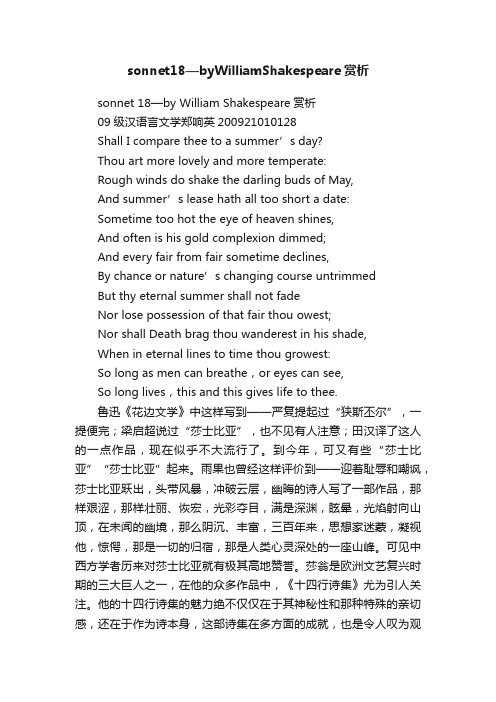
sonnet18—byWilliamShakespeare赏析sonnet 18—by William Shakespeare赏析09级汉语言文学郑响英200921010128Shall I compare thee to a summer’s day?Thou art more lovely and more temperate:Rough winds do shake the darling buds of May,And summer’s lease hath all too short a date:Sometime too hot the eye of heaven shines,And often is his gold complexion dimmed;And every fair from fair sometime declines,By chance or nature’s changing course untrimmedBut thy eternal summer shall not fadeNor lose possession of that fair thou owest;Nor shall Death brag thou wanderest in his shade,When in eternal lines to time thou growest:So long as men can breathe,or eyes can see,So long lives,this and this gives life to thee.鲁迅《花边文学》中这样写到——严复提起过“狭斯丕尔”,一提便完;梁启超说过“莎士比亚”,也不见有人注意;田汉译了这人的一点作品,现在似乎不大流行了。
到今年,可又有些“莎士比亚”“莎士比亚”起来。
雨果也曾经这样评价到——迎着耻辱和嘲讽,莎士比亚跃出,头带风暴,冲破云层,幽晦的诗人写了一部作品,那样艰涩,那样壮丽、恢宏,光彩夺目,满是深渊,眩晕,光焰射向山顶,在未闻的幽境,那么阴沉、丰富,三百年来,思想家迷蒙,凝视他,惊愕,那是一切的归宿,那是人类心灵深处的一座山峰。
Sonnet 18 英文赏析
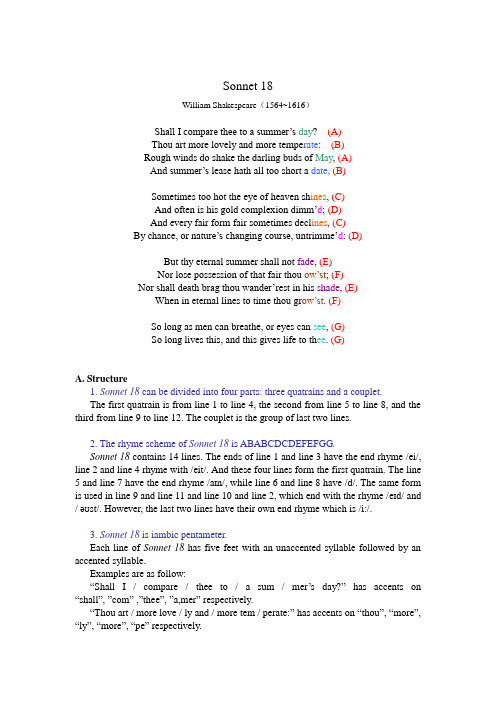
Sonnet 18William Shakespeare(1564~1616)Shall I compare thee to a summer’s day? (A)Thou art more lovely and more tempe rate: (B)Rough winds do shake the darling buds of May, (A)And summer’s lease hath all too short a date, (B)Sometimes too hot the eye of heaven sh ines, (C)And often is his gold complexion dimm’d; (D)And every fair form fair sometimes decl ines, (C)By chance, or nat ure’s changing course, untrimme’d: (D)But thy eternal summer shall not fade, (E)Nor lose possession of that fair thou ow’st; (F)Nor shall death brag thou wander’rest in his shade, (E)When in eternal lines to time thou gr ow’st. (F)So long as men can breathe, or eyes can see, (G)So long lives this, and this gives life to th ee. (G)A. Structure1. Sonnet 18 can be divided into four parts: three quatrains and a couplet.The first quatrain is from line 1 to line 4, the second from line 5 to line 8, and the third from line 9 to line 12. The couplet is the group of last two lines.2. The rhyme scheme of Sonnet 18 is ABABCDCDEFEFGG.Sonnet 18 contains 14 lines. The ends of line 1 and line 3 have the end rhyme /ei/, line 2 and line 4 rhyme with /eit/. And these four lines form the first quatrain. The line 5 and line 7 have the end rhyme /aɪn/, while line 6 and line 8 have /d/.The same form is used in line 9 and line 11 and line 10 and line 2, which end with the rhyme /eɪd/ and /əʊst/. However, the last two lines have their own end rhyme which is /i:/.3. Sonnet 18 is iambic pentameter.Each line of Sonnet 18 has five feet with an unaccented syllable followed by an accented syllable.Examples are as follow:“Shall I / compare / thee to / a sum / mer’s day?”has accents on “shall”, ”com” ,”thee”, ”a,mer” respectively.“Thou art / more love / ly and / more tem / perate:” has accents on “thou”, “more”, “ly”, “more”, “pe” respectively.B. Language use1. Several kinds of rhetoric are used.Metaphor: “T he eye of heaven” means the sun.Simile: “Shall I compare thee to a summer’s day?”uses simile to compare the loved to a summer’s day.Personification: “his gold complexion” personates the summer’s day and “shake the darling buds” uses “shake” to personate the rough winds.Inversion: “And every f air form fair sometimes declines” can be in the order like this: “And every fair sometime declines from fair”.“By chance, or nat ure’s changing course, untr imme’d” can be in the order like this: “untrimmed by chance or nature's changing course”.2. Old English useThee: “you” as objectThou: “you” as subjectArt: areHath: hasThy: “your” followed by a consonant3. Images“A summer's day” means the season of summer.“Day” means a period of time.“Lease” means allotted time.“The eye of heaven” means sun.“His its” means sun.“Fair” means something beautiful.“This” means this poem.C. Appreciation1. Shakespeare compares his friend to a summer’s day. From line 1 to line 8, then he pays attention to praise his friend’s permanence, while from line 9 to line 14, and his focus is shifted towards expressing that poetry is immortal.2. Sonnet 18’s first line asks a question: how can I compare you to a summer’s day?Line 2 answers the question that the loved one is more gentle and lovely.From line 4 to line 8, poet says summer is too short. And sometimes it will shine too much and can be burning while sometimes it will be dimmed when cloudy or overcast. All the beautiful things will finally lose their perfection for nature’s change and instability.From line 9 to line 14, poet starts praising an eternal beauty. This beauty is the beloved one and also the poems, and it is the poems make the loved everlasting.3. The theme of Sonnet 18 is that love is the only thing that can conquer all the things in the world and the beauty is the immortal thing that can never be replaced.。
Sonnet18(英文赏析)
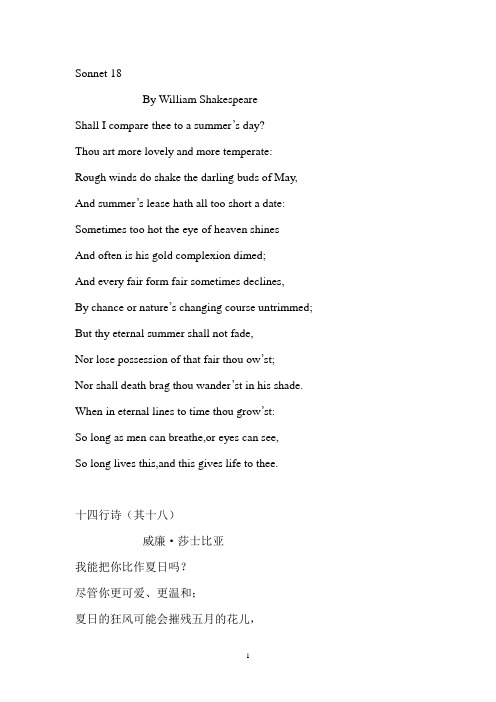
Sonnet 18By William ShakespeareShall I compare thee to a summer’s day?Thou art more lovely and more temperate: Rough winds do shake the darling buds of May, And summer’s lease hath all too short a date: Sometimes too hot the eye of heaven shinesAnd often is his gold complexion dimed;And every fair form fair sometimes declines,By chance or nature’s changing course untrimmed; But thy eternal summer shall not fade,Nor lose possession of that fair thou ow’st;Nor shall death brag thou wander’st in his shade. When in eternal lines to time thou grow’st:So long as men can breathe,or eyes can see,So long lives this,and this gives life to thee.十四行诗(其十八)威廉·莎士比亚我能把你比作夏日吗?尽管你更可爱、更温和;夏日的狂风可能会摧残五月的花儿,季节的限制又减少了可拥有的日光;天空的巨眼有时过于灼热,常使自身的辉煌无故湮没;每一种美都会消逝,不管愿意或是无奈;然而你这盛夏将永存不朽,连你所有的美都不会褪去;死神不忍逼近,生命只会长存;只要人类能呼吸,能看见;我的诗就会存在,而你的生命也会延续。
(完整版)Sonnet130及赏析
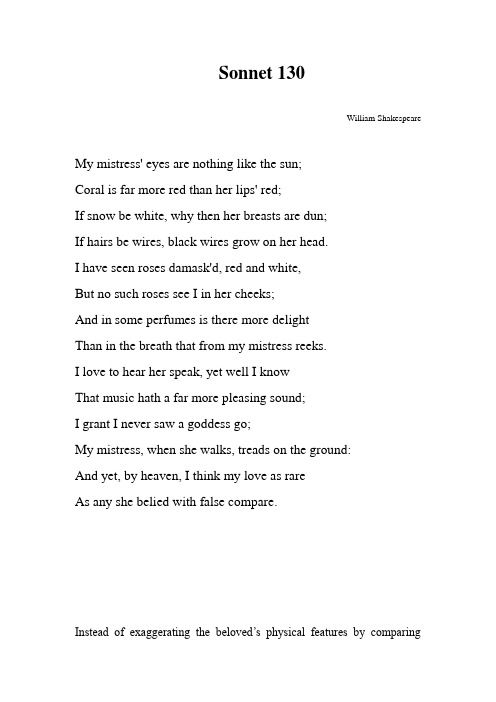
Sonnet 130William ShakespeareMy mistress' eyes are nothing like the sun;Coral is far more red than her lips' red;If snow be white, why then her breasts are dun;If hairs be wires, black wires grow on her head.I have seen roses damask'd, red and white,But no such roses see I in her cheeks;And in some perfumes is there more delightThan in the breath that from my mistress reeks.I love to hear her speak, yet well I knowThat music hath a far more pleasing sound;I grant I never saw a goddess go;My mistress, when she walks, treads on the ground:And yet, by heaven, I think my love as rareAs any she belied with false compare.Instead of exaggerating the beloved’s physical features by comparingthem to the sun, coral, snow, roses, perfumes, goddesses, the speaker in the Shakespeare sonnet 130 declares that he can proclaim his love for her while maintaining her humanness.First Quatrain –“…black wires grow on her head”Instead of exaggerating the beauty of his lady’s eyes by claiming that they outshine the sun, this down-to-earth speaker asserts that those eyes are “nothing like the sun.” He fails to describe the eyes at all, but as he continues through other body parts, he becomes more expressive.Her lips are not as red as coral, though they are red, just not as red as coral. Her breasts are not as white as snow; they are actually a shade of brown, as all humans beings are various shades of brown. And her hair instead of silky strands look more like “black wires” sticking ou t of her head.Second Quatrain –“no such roses see I in her cheeks”The speaker lets us know that he has experience the beauty of a variegated rose, but he does not see those roses on the cheeks of his beloved. And he admits that some perfumes are actually more pleasing to his nose than the breath that exhales from his beloved.The meaning of the word “reek” has changed somewhat from Shakespeare’s time. It meant “exhale” or “exudes” in the 16th and 17th century at the beginning of modern English, but now it designates an unpleasant odor.Third Quatrain –“I grant I never saw a goddess go,—“In the third quatrain, the speaker does something that has been conspicuously lacking in the first and second; he says, “I love to hear her speak . . .” So far the belov ed by comparison to the sun, coral, snow, roses, and perfume has come up lacking, or so it seemed. All of these natural phenomena seemed to outshine her, but now he has said something positive about her and it happens to be her voice that he loves. However, he does admit that even though he loves her voice, he knows it is not as “pleasing” as music. And although he has never seen a goddess walk, he knows that his beloved just “treads on the ground.” But, as far as the speaker knows, maybe a goddess would just tread on the ground also. The Couplet –“I think my love as rare”In the couplet, the speaker swears that he loves his mistress just as much as those poets who exaggerate their beloveds’ features. He loves her simply because she is rare, or a unique individual.If he claimed her eyes were like the sun, one who looked would see that they are not, and her reality would belie, that is, make false, that comparison. The speaker wishes to proclaim his love but in truthful, human terms; he no doubt believes that that is also rare.我。
Sonnet130及赏析(最新整理)
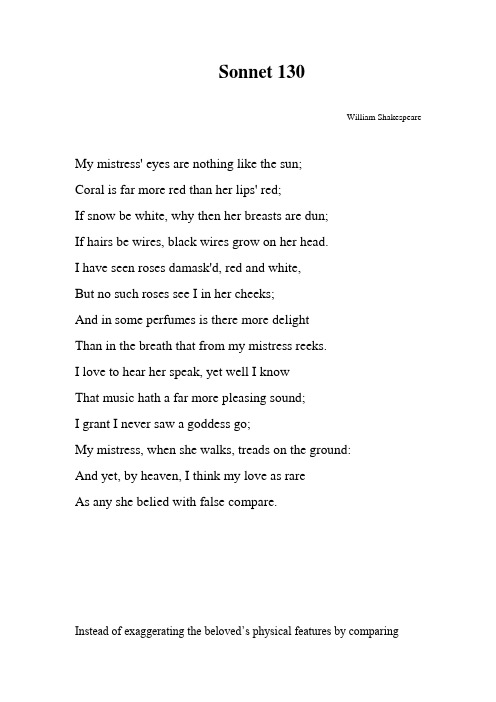
Sonnet 130William ShakespeareMy mistress' eyes are nothing like the sun;Coral is far more red than her lips' red;If snow be white, why then her breasts are dun;If hairs be wires, black wires grow on her head.I have seen roses damask'd, red and white,But no such roses see I in her cheeks;And in some perfumes is there more delightThan in the breath that from my mistress reeks.I love to hear her speak, yet well I knowThat music hath a far more pleasing sound;I grant I never saw a goddess go;My mistress, when she walks, treads on the ground:And yet, by heaven, I think my love as rareAs any she belied with false compare.Instead of exaggerating the beloved’s physical features by comparingthem to the sun, coral, snow, roses, perfumes, goddesses, the speaker in the Shakespeare sonnet 130 declares that he can proclaim his love for her while maintaining her humanness.First Quatrain –“…black wires grow on her head”Instead of exaggerating th e beauty of his lady’s eyes by claiming that they outshine the sun, this down-to-earth speaker asserts that those eyes are “nothing like the sun.” He fails to describe the eyes at all, but as he continues through other body parts, he becomes more expressive.Her lips are not as red as coral, though they are red, just not as red as coral. Her breasts are not as white as snow; they are actually a shade of brown, as all humans beings are various shades of brown. And her hair instead of silky strands look more like “black wires” sticking out of her head.Second Quatrain –“no such roses see I in her cheeks”The speaker lets us know that he has experience the beauty of a variegated rose, but he does not see those roses on the cheeks of his beloved. And he admits that some perfumes are actually more pleasing to his nose than the breath that exhales from his beloved.The meaning of the word “reek” has changed somewhat from Shakespeare’s time. It meant “exhale” or “exudes” in the 16th and 17th century at the beginning of modern English, but now it designates an unpleasant odor.Third Quatrain –“I grant I never saw a goddess go,—“In the third quatrain, the speaker does something that has been conspicuously lacking in the first and second; he says, “I love to hear her speak . . .” So far the beloved by comparison to the sun, coral, snow, roses, and perfume has come up lacking, or so it seemed. All of these natural phenomena seemed to outshine her, but now he has said something positive about her and it happens to be her voice that he loves. However, he does admit that even though he loves her voice, he knows it is not as “pleasing” as music. And although he has never seen a goddess walk, he knows that his beloved just “treads on the ground.” But, as far as the speaker knows, maybe a goddess would just tread on the ground also. The Couplet –“I think my love as rare”In the couplet, the speaker swears that he loves his mistress just as much as thos e poets who exaggerate their beloveds’ features. He loves her simply because she is rare, or a unique individual.If he claimed her eyes were like the sun, one who looked would see that they are not, and her reality would belie, that is, make false, that comparison. The speaker wishes to proclaim his love but in truthful, human terms; he no doubt believes that that is also rare.我“”“”At the end, Xiao Bian gives you a passage. Minand once said, "people who learn to learn are very happy people.". In every wonderful life, learning is an eternal theme. As a professional clerical and teaching position, I understand the importance of continuous learning, "life is diligent, nothing can be gained", only continuous learning can achieve better self. Only by constantly learning and mastering the latest relevant knowledge, can employees from all walks of life keep up with the pace of enterprise development and innovate to meet the needs of the market. This document is also edited by my studio professionals, there may be errors in the document, if there are errors, please correct, thank you!。
Sonnet英文赏析
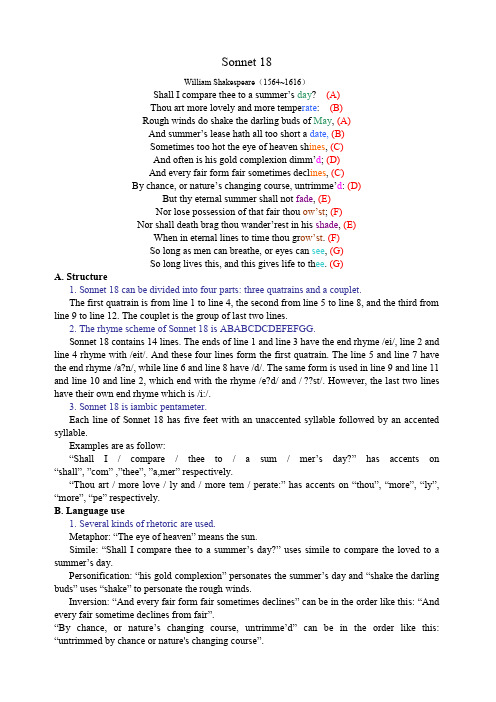
Sonnet 18William Shakespeare(1564~1616)Shall I compare thee to a summer’s day? (A)Thou art more lovely and more tempe rate: (B)Rough winds do shake the darling buds of May, (A)And summer’s lease hath all too short a date, (B)Sometimes too hot the eye of heaven sh ines, (C)And often is his gold complexion dimm’d; (D)And every fair form fair sometimes decl ines, (C)By chance, or nat ure’s changing course, untrimme’d: (D)But thy eternal summer shall not fade, (E)Nor lose possession of that fair thou ow’st; (F)Nor shall death brag thou wander’rest in his shade, (E)When in eternal lines to time thou gr ow’st. (F)So long as men can breathe, or eyes can see, (G)So long lives this, and this gives life to th ee. (G)A. Structure1. Sonnet 18 can be divided into four parts: three quatrains and a couplet.The first quatrain is from line 1 to line 4, the second from line 5 to line 8, and the third from line 9 to line 12. The couplet is the group of last two lines.2. The rhyme scheme of Sonnet 18 is ABABCDCDEFEFGG.Sonnet 18 contains 14 lines. The ends of line 1 and line 3 have the end rhyme /ei/, line 2 and line 4 rhyme with /eit/. And these four lines form the first quatrain. The line 5 and line 7 have the end rhyme /a?n/, while line 6 and line 8 have /d/.The same form is used in line 9 and line 11 and line 10 and line 2, which end with the rhyme /e?d/ and /??st/. However, the last two lines have their own end rhyme which is /i:/.3. Sonnet 18 is iambic pentameter.Each line of Sonnet 18 has five feet with an unaccented syllable followed by an accented syllable.Examples are as follow:“Shall I / compare / thee to / a sum / mer’s day?”has accents on “shall”, ”com” ,”thee”, ”a,mer” respectively.“Thou art / more love / ly and / more tem / perate:” has accents on “thou”, “more”, “ly”, “more”, “pe” respectively.B. Language use1. Several kinds of rhetoric are used.Metaphor: “T he eye of heaven” means the sun.Simile: “Shall I compare thee to a summer’s day?” uses simile to compare the loved to a summer’s day.Personification: “his gold complexion” personates the summer’s day and “shake the darling buds” uses “shake” to personate the rough winds.Inversion: “And every f air form fair sometimes declines” can be in the order like this: “And every fair sometime declines from fair”.“By chance, or nat ure’s changing course, untr imme’d”can be in the order like this: “untrimmed by chance or nature's changing course”.2. Old English useThee: “you” as objectThou: “you” as subjectArt: areHath: hasThy: “your” followed by a consonant3. Images“A summer's day” means the season of summer.“Day” means a period of time.“Lease” means allotted time.“The eye of heaven” means sun.“His its” means sun.“Fair” means something beautiful.“This” means this poem.C. Appreciation1. Shakespeare compares his friend to a summer’s day. From line 1 to line 8, then he pays attention to praise his friend’s permanence, while from line 9 to line 14, and his focus is shifted towards expressing that poetry is immortal.2. Sonnet 18’s first line asks a question: how can I compare you to a summer’s day?Line 2 answers the question that the loved one is more gentle and lovely.From line 4 to line 8, poet says summer is too short. And sometimes it will shine too much and can be burning while sometimes it will be dimmed when cloudy or overcast. All the beautiful things will finally lose their perfection for nature’s change and instability.From line 9 to line 14, poet starts praising an eternal beauty. This beauty is the beloved one and also the poems, and it is the poems make the loved everlasting.3. The theme of Sonnet 18 is that love is the only thing that can conquer all the things in the world and the beauty is the immortal thing that can never be replaced.。
sonnet18 的英文赏析(部分)
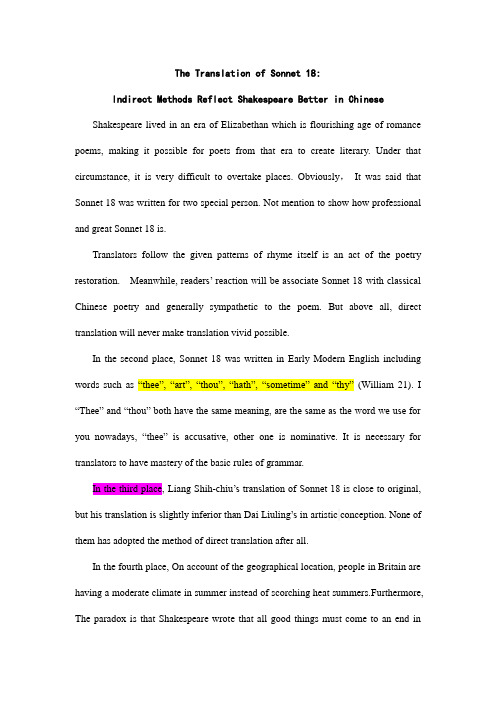
The Translation of Sonnet 18:Indirect Methods Reflect Shakespeare Better in Chinese Shakespeare lived in an era of Elizabethan which is flourishing age of romance poems, making it possible for poets from that era to create literary. Under that circumstance, it is very difficult to overtake places. Obviously,It was said that Sonnet 18 was written for two special person. Not mention to show how professional and great Sonnet 18 is.Translators follow the given patterns of rhyme itself is an act of the poetry restoration. Meanwhile, readers’ reaction will be associate Sonnet 18 with classical Chinese poetry and generally sympathetic to the poem. But above all, direct translation will never make translation vivid possible.In the second place, Sonnet 18 was written in Early Modern English including words such as “thee”, “art”, “thou”, “hath”, “sometime” and “thy”(William 21). I “Thee” and “thou” both have the same meaning, are the same as the word we use for you nowadays, “thee” is accusative, other one is nominative. It is necessary for translators to have mastery of the basic rules of grammar.In the third place, Liang Shih-chiu’s translation of Sonnet 18 is close to original, but his translation is slightly inferior than Dai Liuling’s in artistic conception. None of them has adopted the method of direct translation after all.In the fourth place, On account of the geographical location, people in Britain are having a moderate climate in summer instead of scorching heat summers.Furthermore, The paradox is that Shakespeare wrote that all good things must come to an end inline 7, line 8 is actually doing matting to the next lines,.In the eyes of Shakespeare, there is no doubt that “thou” will s pread through the ages just like what he wrote in his las t two lines are expressed by “men can breathe”, “eyes can see” (William 21).In the fifth place, Sonnet 18 is not perfect despite its classic, indirect translation is a vital part during propagation. Most of the college student s don’t appreciate Sonnet 18 based on teaching investigation. It is normal that classical poetry are n’t popular, but it is vain to ascribe this phenomenon to readers or the society. Few people can look again for the classical poetry. However, flaws in text itself maybe the reason why they are unpopular. On the one hand, although Sonnet 18 consists of three quatrains and a couplet, the rhyme isn’t neat. The stress placement of the end rhyme are difference, despite “temperate” in line 2 and “date” in line 4 are end with “ate”. Compared with the other lines, this rhyme is abrupt. The two “ands” in the beginning of line 6 and line 7 should function as a progressive alliteration rather than a parallel one. Meter, rhyme and stanza, in the right hands, can be inescapably precise as to tone, rhythm, emphasis and the stages of the argument. Shakespeare was overdoing it in Sonnet 18, it’s disrupted the form of Sonnet 18 and fragmented the melody and rhythm. All these factors had negative impact on Sonnet 18. Actually, the readers foun d that difficult to read bumpy sentences. On the other hand, “And every fair from fair sometime declines”(William 21) was written in obscure way that readers may feel abstract. “Summer” has a lease but the lease is short, from “And summer’s lease hath all too short a date” (William 21) in line 4. The sheer aesthetics that Shakespeare goes for in some ways readers may feel strange. There were anthropomorphic, forexample, “death” doesn’t exist, not to mention that it could brag, but this descriptive method is commonplace for such a classical poem. It is a truth acknowledged by anyone that life is short and time is swift, simple truth are told in the presentation of complex information, readers may not feel cordiality and geniality. Indirect translation can put original version into a band new one, to avoid this situation and make the work get better and better, especially be particularly important for readers under this circumstances. Direct translation will never make that happen and only make matters worse.When I learnt an ancient poem as a pupil, I wasn’t learning at the right level, I just learnt the words, not the message, then I asked my teacher for help. My teacher Would told me about the profound intent. When I read a poem, especially the translatio n, it’s not just about the literal meaning, I want to know the inner meaning of it, including its cultural background, historical origin and so on. After reading, I must learn some new knowledge, that’s the meaning of reading. Indirect translation is like my teacher, making my read smoothly and understandingly.Sonnet 18 is one of the most beautiful sonnets written by Shakespeare. In this sonnet, the poet writes beautifully on the conventional theme that his poetry will bring eternity to the one he loves a nd eulogizes. However, it’s more than that.Conceptual Blending Theory is used in this paper to analyze why literal translation and liberal translation arise in translation. It points out that, when translating the rhetorical devices in English titles, both translational equivalence and functional equivalence can be taken as the criteria.。
Sonnet130及赏析
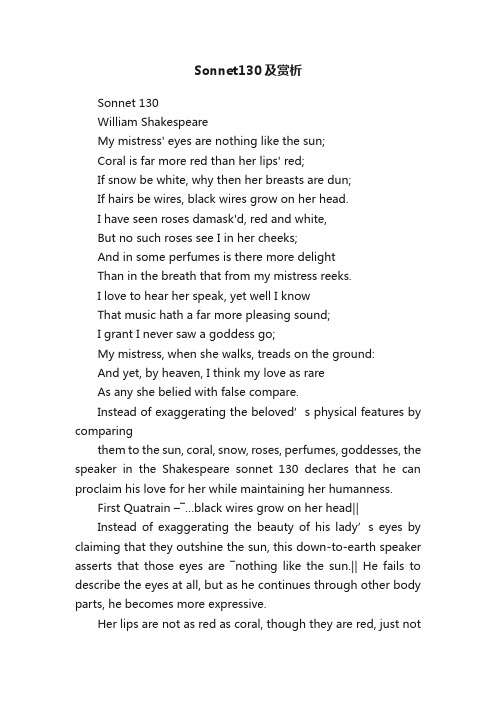
Sonnet130及赏析Sonnet 130William ShakespeareMy mistress' eyes are nothing like the sun;Coral is far more red than her lips' red;If snow be white, why then her breasts are dun;If hairs be wires, black wires grow on her head.I have seen roses damask'd, red and white,But no such roses see I in her cheeks;And in some perfumes is there more delightThan in the breath that from my mistress reeks.I love to hear her speak, yet well I knowThat music hath a far more pleasing sound;I grant I never saw a goddess go;My mistress, when she walks, treads on the ground:And yet, by heaven, I think my love as rareAs any she belied with false compare.Instead of exaggerating the beloved’s phy sical features by comparingthem to the sun, coral, snow, roses, perfumes, goddesses, the speaker in the Shakespeare sonnet 130 declares that he can proclaim his love for her while maintaining her humanness.First Quatrain –―…black wires grow on her head‖Instead of exaggerating the beauty of his lady’s eyes by claiming that they outshine the sun, this down-to-earth speaker asserts that those eyes are ―nothing like the sun.‖ He fails to describe the eyes at all, but as he continues through other body parts, he becomes more expressive.Her lips are not as red as coral, though they are red, just notas red as coral. Her breasts are not as white as snow; they are actually a shade of brown, as all humans beings are various shades of brown. And her hair instead of silky strands look more like ―black wires‖ sticking ou t of her head.Second Quatrain –―no such roses see I in her cheeks‖The speaker lets us know that he has experience the beauty of a variegated rose, but he does not see those roses on the cheeks of his beloved. And he admits that some perfumes are actually more pleasing to his nose than the breath that exhales from his beloved.The meaning of the word ―reek‖ has changed somewhat from Shakespeare’s time. It meant ―exhale‖ or ―exudes‖ in the 16th and 17th century at the beginning of modern English, but now it designates an unpleasant odor.Third Quatrain –―I grant I never saw a goddess go,—―In the third quatrain, the speaker does something that has been conspicuously lacking in the first and second; he says, ―I love to hear her speak . . .‖ So far the belov ed by comparison to the sun, coral, snow, roses, and perfume has come up lacking, or so it seemed. All of these natural phenomena seemed to outshine her, but now he has said something positive about her and it happens to be her voice that he loves. However, he does admit that even though he loves her voice, he knows it is not as ―pleasing‖ as music. And although he has never seen a goddess walk, he knows that his beloved just ―treads on the ground.‖ Bu t, as far as the speaker knows, maybe a goddess would just tread on the ground also. The Couplet –―I think my love as rare‖In the couplet, the speaker swears that he loves his mistress just as much as those poets who exaggerate their beloveds’features. He loves her simply because she is rare, or a unique individual.If he claimed her eyes were like the sun, one who looked would see that they are not, and her reality would belie, that is, make false, that comparison. The speaker wishes to proclaim his love but in truthful, human terms; he no doubt believes that that is also rare.我。
- 1、下载文档前请自行甄别文档内容的完整性,平台不提供额外的编辑、内容补充、找答案等附加服务。
- 2、"仅部分预览"的文档,不可在线预览部分如存在完整性等问题,可反馈申请退款(可完整预览的文档不适用该条件!)。
- 3、如文档侵犯您的权益,请联系客服反馈,我们会尽快为您处理(人工客服工作时间:9:00-18:30)。
S o n n e t18 By William ShakespeareShall I compare thee to a summer’s day?Thou art more lovely and more temperate:Rough winds do shake the darling buds of May,And summer’s lease hath all too short a date:Sometimes too hot the eye of heaven shinesAnd often is his gold complexion dimed;And every fair form fair sometimes declines,By chance or nature’s changing course untrimmed;But thy eternal summer shall not fade,Nor lose possession of that fair thou ow’st;Nor shall death brag thou wander’st in his shade.When in eternal lines to time thou grow’st:So long as men can breathe,or eyes can see,So long lives this,and this gives life to thee.十四行诗(其十八)威廉·莎士比亚我能把你比作夏日吗?尽管你更可爱、更温和;夏日的狂风可能会摧残五月的花儿,季节的限制又减少了可拥有的日光;天空的巨眼有时过于灼热,常使自身的辉煌无故湮没;每一种美都会消逝,不管愿意或是无奈;然而你这盛夏将永存不朽,连你所有的美都不会褪去;死神不忍逼近,生命只会长存;只要人类能呼吸,能看见;我的诗就会存在,而你的生命也会延续。
Sonnet 18 is absolutely one of the most famous sonnets of Shakespeare. Almost every English learner can recite some lines of it either for appreciation or pleasure as both the thematic feature and artistic feature shine brightly and attractively. In the following,I will illustrate my understanding of this sonnet in these two aspects.Firstly,something about the sonnet’s thematic feaure.The first two lines ,in the form of a question and an assertive statement, show the poet’s idea of comparing his beloved with a summer’s day and also point out that the beloved person is more beautiful and less extreme than summer. It is understandable that summer is chosen as the comparison target because it is lovely and pleasant. While the next sixlines describe the less pleasant aspects of summer:the too stong wind,the extreme hot weather as well as the easy disappearance of all beauties. The ninth line takes up the comparison with summer again: summer has by now become the summer of life. The comparison turns into a contrast by referring back to the seventh. The poet's assurance becomes even firmer in lines eleven and twelve, which contain a promise that death will be conquered that the beloved one’s spirit and life will surely be eternal.The last two lines furthur emphasize the poet’s belief that the eternity of spirit and virtue of his beloved by pointing out the poem’s eternal function and existence.With this arrangement of structure and content,the poet gives this sonnet two thematic meanings.The primary meaning is simply a statement to praise the beauty of the beloved one. But the more important and deep one is the poet’s thought that the power of the poem which can defy time and last forever.Its double themes is one distinguishing feature of the sonnet.Secondly,the analysis of this sonnet’s artistic feature.It contains 14 lines.We can easily observe that the ends of line 1 and line 3 have the end rhyme:/ei/,line 2 and line 4 rhyme with /eit/.And these four lines form a quatrain. The same form is used in the second quatrain from line 5 to line 8,the third quatrain from line 9 to line 12. However,the last two lines have their own form,as they have the endrhyme:/i:/Each line in this sonnet is in iambic pentameter which means each line has five feet, usually an unaccented syllable followed by an accented syllable.For example,we can divide the first line into five independent feet as “Shall I / compare / thee to/ a sum / mer’s day?”with accents on shall,com,thee,a,mer respectively.We can also find some repetitions of the same words in the beginning of several lines,such as the “And” used in the line 6 and 7,the “Nor”in line 10 and 11,the “so long”in line 13 and 14. The alliteration also exists in this sonnet.Both make the sonnet’s tone much more melodious.Some figures of speech are also in use like simile and personification. We can see the sun is regarded as “the eye of heaven” which is a simile. We can find the word “his” used to describe the sun and the death which gives them life as the illustration of the use of personification. This makes the images the poet points out linked to each other and vividly form the whole imagery.To make a general conclusion of its stylistic feature,this sonnet is a typical Shakespearian sonnet with fourteen lines in iambic pentameter, including three quatrains and one couplet with the rhyme scheme ababcdcdefefgg. Besides this, sonnet 18 is in use of alliteration and figures of speech which add more beauty to the tonality of the poem. That’s all my understanding of the distinctive features of William Shakespeare’s Sonnet 18 from thematic and stylistic perspectives.。
